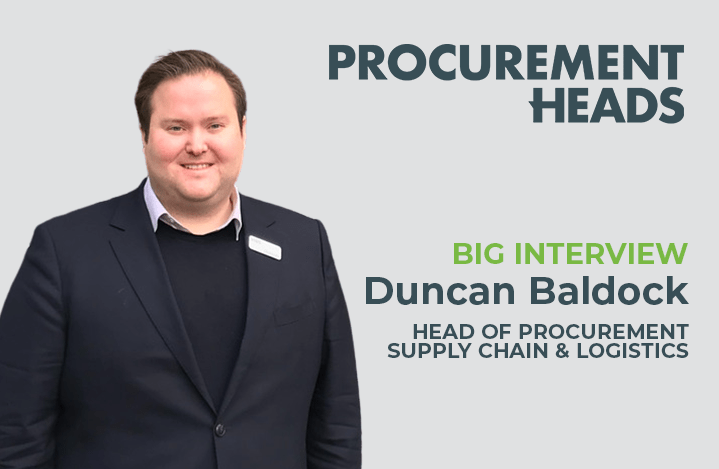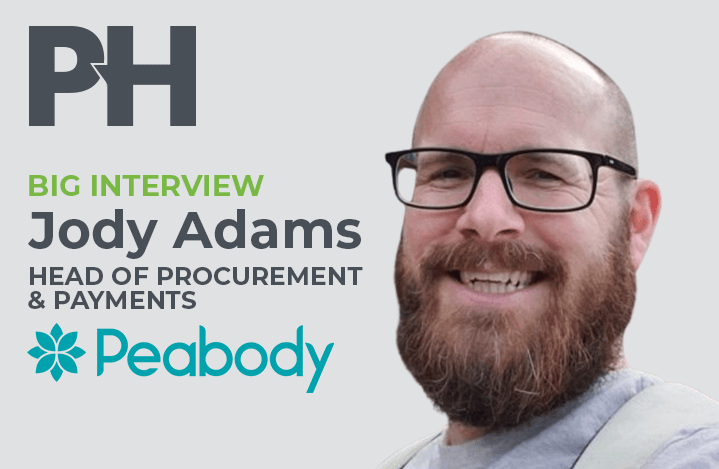For Procurement Heads‘ latest Big Interview, he spoke with James Dobbin about his procurement career and areas of procurement he finds challenging.
How did you get into Procurement?
I started on the shop floor at John Lewis at Christmas time, which was the toughest role I have ever had.
I then applied for Tesco clothing graduate scheme – they decided I wouldn’t be suited to a fashion career and suggested I looked at group Procurement by asking if I enjoyed buying chairs and tables.
The description of buying tables and chairs was hugely inaccurate with regards to what procurement does and they didn’t really sell it to me, but it was the height of the recession and I was keen to get on a graduate scheme.
So I really fell into Procurement and haven’t looked back.
What does your typical day at work look like?
I wake up at 05:45 and leave the house at 6:45.
I’ll have a coffee when I get to work, clear any emails and look at my diary before I start meeting people.
I try and get around to the stakeholders as much as possible.
I am very much about being forward-facing. It’s really important in Procurement to be constantly talking to people and engaging with the business to drive value.
I’ll then focus on the next steps for the week and what my key messages with stakeholders and suppliers will be.
What do you love about Procurement?
The challenge and ability to make a difference if you partner with your business.
Procurement, if done well, really has the ability to contribute and shape the strategy of a business to fulfil customers’ desires.
I also love working with my team and developing them to become great business leaders who can make a change. You have to be a retailer followed by commercial and then Procurement in order to really make a change so you can understand the business.
I think I’m going to have a great time at M&S as we’re really trying to make sure the Procurement team delivers value – historically M&S Procurement focused very much on the blind process rather than delivering continuous improvements, value beyond a tender and being true business partners who can challenge the status quo.
Are there any aspects of Procurement you find challenging?
Procurement needs to constantly evolve to remain relevant and to be business partners to your business colleagues.
I’ve always worked in retail Procurement and this is fantastic for a Procurement professional as retail is always under pressure. But if you have ideas that can help to deliver value you can really be listened to and involved.
You don’t want to be in a business that earns lots of margin because then why would the cost base be relevant?
Procurement as a role is always challenging as we have to constantly influence and network to help shape the agenda.
From a retail and logistics perspective customers rightly expect better service, better value and to be cared for – procurement can really support in this by creating value for the business through managing risk and looking for improvements.
If you could give advice to your younger self, what would it be?
Network more and talk to people to understand their concerns and actively listen, see how you can help them and how Procurement can deliver value between cost and service.
Never lead just on cost savings, this will switch your audience off.
Everything should be about creating value and having a balance between cost and service.
What inspires you as a Procurement leader?
The ability to make a transformative change to a business by delivering value.
I think it is really aligned to a business’ strategy.
That doesn’t mean you do whatever other people say all the time, but it means you have a seat at the table and the right to challenge through knowing your stuff and delivering what Procurement should do: creating value, managing risk and driving continuous improvement.
It’s not just about savings but about delivering a company’s strategic vision to serve customers and that means making sure there is a balance between cost and service.
Also, we need to manage risk and make sure we’re delivering benefits throughout the contract lifecycle by being business partners and challenging our stakeholders and service providers. I thoroughly enjoy working across businesses doing a mix of commercial, project management, legal and finance.
What skills do you consider essential to be a Procurement leader?
Be open-minded and ask questions and be curious and get the views of stakeholders and suppliers.
Also, have the confidence to constructively challenge your business to deliver more and do more for your customers, whether that is improving service or making the cost base work harder. To do this you need to be a commercial leader in the category you love so you have credibility when working in partnership with suppliers and stakeholders.
Understanding the cost model that makes up your market inside out, that’s when if you are asked a question you can really shine. Don’t just be focused on cost, work collaboratively with your stakeholders to provide value and also make sure there is a balance between cost, service and the customer proposition.
The ability to network and actively communicate is really key as being willing to meet people and have a connection that goes beyond a project. Business is about relationships and not running blind procurement processes – you need to be a true business partner.
Who has had the most influence on your Procurement career?
Two people; one personal and one professional.
My wife Chloe has been a great support to me and has always picked me up after a bad day and really encouraged me on, which is invaluable while working in a business area that you need to constantly influence people in.
From a work perspective, I worked with Patrick Dunne at both Boots and Sainsbury’s and he really helped me to develop my commercial focus in Procurement and helped me to develop my skills on creating value beyond just savings.
Now I’ve started at Marks & Spencer I’m really enjoying working for Andrew Newnham, who has a great focus on creating value and being a business partner to the business, which will help Procurement to become very relevant at M&S.
What do you like doing in your spare time? Do you have any favourite books, films, destinations, sports etc?
Walking in the countryside and in the Swiss Alps.
I also enjoy a beer in the pub and try and go to Muse concerts and relax as much as possible.
Is work/life balance important? If so, how do you achieve it?
Yes, it is important to switch off after work and be flexible in work and life.
Retail is tough, so taking time to recharge mentally is important.
However, in retail, you always need to be ready to be available because if something goes wrong it tends to go very wrong and you need to be there to support should business partners need you.
The higher up you go in business the more your public and private life merge.
It is really trying to find the balance in work to relax during a day but then also knowing that if your business needs you, you need to be available.
I do think holidays are important though!





